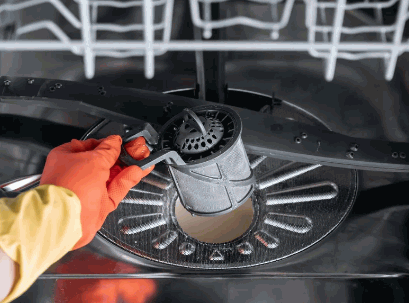When your dishwasher starts to back up, it’s tempting to reach for a drain cleaner for a quick fix. But is this really a safe solution?
This article explores the risks associated with using drain cleaner in your dishwasher, including potential damage to the appliance and health hazards.
It also discusses safer alternatives like baking soda and vinegar, and shares tips on preventing clogs.
Additionally, learn how to identify signs of a clogged dishwasher drain. Dive in to keep your dishwasher running smoothly!
Discover: How To Keep Kitchen Drain Clean And Fresh
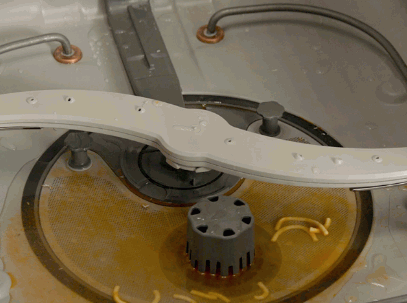
Can You Use Drain Cleaner In Dishwasher?
Using drain cleaner in a dishwasher might seem like a quick solution for clogged pipes, but it raises multiple concerns for homeowners. Many people look for effective cleaning and unclogging remedies to keep their appliances running smoothly and to ensure freedom from foul odors and dirty dishes, while also considering home remedies like baking soda and vinegar for better results. However, employing harsh chemicals often leads to severe damage to both the machine and its components, which may cause long-term issues that outweigh the initial benefits. Therefore, understanding the risks associated with drain cleaners is crucial for maintaining the integrity of your dishwasher.
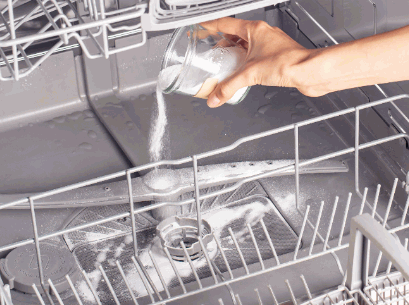
What Are The Risks Of Using Drain Cleaner In Dishwasher?
Regarding using drain cleaners in dishwashers, several significant risks must be considered. These chemicals are designed to break down food debris and other clogs within plumbing systems, but their aggressive nature can cause irreversible damage to delicate components of your appliance, potentially making it less efficient or even inoperable. Furthermore, such chemicals can leave harmful residues that lead to unpleasant odors and may even affect the cleanliness of your dishes.
Damage To Dishwasher
Using drain cleaners can lead to significant damage to your dishwasher, often resulting in costly repairs or replacements. The harsh chemicals can corrode the internal components, including the filter, drain, and even the heating element, which is essential for effective cleaning cycles. Homeowners should be vigilant for signs of damage, as early identification can save them time and money.
Specifically, the impact on appliance care is notable when considering that drain cleaners can weaken the seals and gaskets, leading to leaks and inefficiency. Over time, these issues can escalate, potentially forcing a homeowner to choose between an expensive repair and a complete replacement of the unit.
Recognizing
- unusual noises during operation
- standing water at the bottom
- inconsistent cleaning results
as warning signs is crucial. By promptly addressing these symptoms and opting for safer maintenance solutions, appliance longevity can often be preserved, circumventing the pitfalls of chemical damage.
Harmful Chemicals
The harmful chemicals found in many drain cleaners pose a significant risk not only to the dishwasher but also to the health of those using them. Chemical reactions can create toxic fumes and residues that linger in your appliance, potentially contaminating your dishes and leading to unpleasant odors. Homeowners should prioritize safer cleaning solutions to avoid these risks.
Among the most concerning ingredients in conventional drain cleaners are caustic soda, sodium hydroxide, and hydrochloric acid. These substances can cause severe respiratory issues and skin irritation upon contact or inhalation. Their corrosive nature can lead to undue wear and tear on appliances, ultimately shortening their lifespan.
- Health Risks:
- Respiratory issues
- Skin irritation
- Damage to appliances
For those looking to maintain their homes without compromising safety, alternatives such as baking soda and vinegar, or enzyme-based cleaners, can effectively clear clogs while being gentler on both health and equipment.
Potential Health Risks
The potential health risks associated with using drain cleaners in dishwashers are often overlooked. Exposure to the toxic fumes emitted by these chemicals can cause respiratory issues and skin irritations, making it crucial for homeowners to consider the safety of their families when choosing cleaning methods. It’s essential to carefully read labels and understand the long-term consequences of using such products.
These harmful chemicals can linger in the air and on surfaces, contributing to unpleasant odors and creating an unhealthy home environment. It is advisable to explore alternatives such as eco-friendly cleaning agents, which not only protect appliances but also minimize health risks.
- Consider using baking soda or vinegar as natural cleaning solutions.
- Avoid mixing different cleaning chemicals to prevent toxic reactions.
- Ensure proper ventilation during cleaning to reduce fume exposure.
By implementing these preventative measures, homeowners can maintain a healthier living space while effectively managing odors.
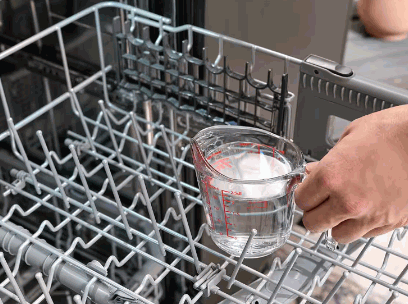
What Are The Alternatives To Using Drain Cleaner In Dishwasher?
There are several effective alternatives to using drain cleaners in dishwashers that can help in unclogging and maintaining clean appliances without the associated risks, including professional advice and home remedies. Using natural remedies like baking soda and vinegar offers a safe yet powerful solution for removing food debris and odors, while regular maintenance can keep the dishwasher functioning optimally. Homeowners can easily implement these methods to ensure their dishwashers remain in top condition without exposing their families to harmful chemicals.
Baking Soda And Vinegar
Baking soda and vinegar are a powerful duo for cleaning dishwashers, effectively tackling food debris and odors without harmful chemicals. When combined, they create a fizzy reaction that can help break down stubborn stains and buildup in the machine while also keeping it fresh. This eco-friendly cleaning method is not only safe for your health but also economically efficient for homeowners.
To harness the cleaning prowess of this dynamic duo, follow these step-by-step instructions:
- Begin by emptying the dishwasher, removing any leftover dishes or utensils.
- In a small bowl, mix about one cup of baking soda with your choice of boiling water to create a paste.
- Spread the paste across the dirty elements of the dishwasher, focusing on areas with mineral buildup.
- Add one cup of vinegar directly into the bottom of the dishwasher. This introduces the necessary acidity to dissolve tough grime.
- Run a hot water cycle without any dishes, allowing the mixture to do its job.
- For optimal results, repeat this process monthly to maintain cleanliness and efficiency.
With these tips, utilizing baking soda and vinegar can transform your dishwasher into a sparkling, odor-free appliance.
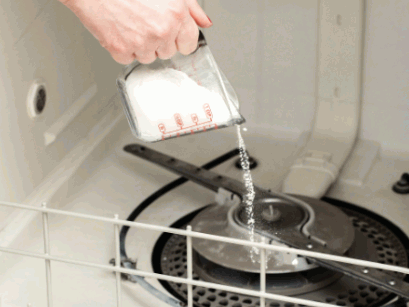
Hot Water And Dish Soap
Hot water and dish soap form another excellent cleaning solution for dishwashers, helping to unclog drains by breaking down grease and food residues. This simple method is effective and safe, allowing homeowners to maintain their appliances without risking damage from harsh chemicals. Regular use of this solution can significantly improve the dishwasher’s performance and prolong its lifespan. Incorporating this cleaning routine can lead to a more efficient appliance.
To use this method, combine a cup of dish soap with a few liters of hot water in a bucket. Follow these steps:
- Ensure the dishwasher is empty to allow for a thorough clean.
- Next, apply the soapy water to the interior surfaces and use a soft cloth or sponge to wipe down all areas, especially the door seals and spray arms.
- After that, run a short cycle with the dishwasher empty, using hot water to rinse out any remaining soap and debris.
For optimal results, homeowners are encouraged to perform this cleaning once a month to prevent clogs and maintain efficiency, ensuring that their dishwasher operates at its best.
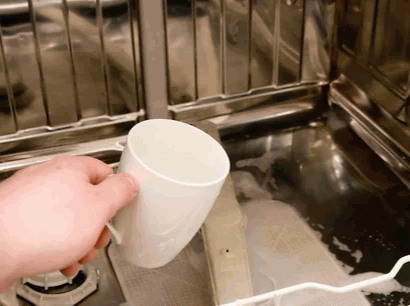
Professional Plumbing Services
Sometimes, the best way to address persistent clogs or cleaning issues in a dishwasher is to enlist the help of professional plumbing services, offering expert assistance in appliance care and cleaning. Experts in the field can provide thorough inspections, cleaning, and maintenance, ensuring that your appliance remains in optimal condition while preventing future problems. Opting for professional assistance ensures that homeowners can focus on regular maintenance and use effective cleaning solutions.
By engaging professionals for dishwasher maintenance, homeowners gain access to a wealth of expertise that can significantly enhance appliance longevity. These specialists offer a range of services designed to tackle specific issues, such as:
- Comprehensive inspections to identify hidden problems
- Debris removal and thorough cleaning of internal components
- Replacement of worn-out parts to prevent breakdowns
- Preventative measures tailored to individual dishwashers
With their in-depth knowledge and specialized tools, these experts not only resolve existing problems but also help mitigate future issues, ensuring your dishwasher operates smoothly and efficiently for years to come, allowing for peace of mind for homeowners.
How To Prevent Clogs In Dishwasher?
Preventing clogs in your dishwasher is essential for maintaining its efficiency and prolonging its lifespan, and it starts with simple maintenance steps such as regular cleaning and checking for food debris before loading. Homeowners can easily incorporate practices such as scraping off food debris before loading, running hot water prior to starting the machine, and scheduling regular cleanings to ensure optimal performance. These proactive measures can help avoid the hassle of dealing with clogged drains and costly repairs down the line.
Scrape Off Food Before Loading: Effective Clog Prevention
One of the simplest yet most effective ways to prevent clogs in your dishwasher is to scrape off food debris and garbage disposal remnants before loading dishes. By eliminating larger particles, homeowners can drastically reduce the chances of blockages in the drain and filter, which can also be affected by items from the garbage disposal. This simple habit saves time and effort in the long run by ensuring the machine runs smoothly and effectively during each cycle, contributing to clog prevention.
Regarding effective debris removal, it’s essential to adopt a systematic approach. Here are some useful tips:
- Rinse before loading: Quickly rinse off any leftover food that clings to the dishes.
- Remove large scraps: Use a spatula or scrape directly into a trash can to prevent buildup.
- Check utensils: Don’t forget to inspect and clear debris from utensils.
By making these practices part of your routine, you maintain a cleaner machine and avoid unnecessary maintenance headaches.
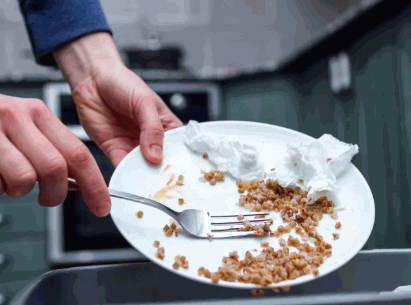
Run Hot Water Before Starting Dishwasher
Running hot water before starting your dishwasher is an excellent practice that prepares the appliance for optimal cleaning performance. This step ensures that food debris is softened, making it easier for the dishwasher to wash and drain effectively. This technique can help reduce odors and improve overall cleaning results, benefiting both the appliance and your dishes.
When you run the hot water, it primes the pipes and delivers the needed temperature directly to the machine, which means that the cleaning efficiency, especially when using products like Beckmanns Service It Deep Clean Dishwasher Cleaner can significantly increase. This is particularly important for ensuring that any greasy residue or stubborn stains are adequately addressed.
Over time, this simple routine can contribute to the longevity of the appliance, reducing wear and tear on its components. Implementing this practice not only enhances cleaning outcomes but also diminishes the likelihood of unpleasant smells lingering in the machine.
- Preheating water enhances cleaning power
- Reduces food particles and debris buildup
- Limits odors by ensuring thorough cleaning
- Contributes to appliance maintenance
Regularly Clean And Maintain Dishwasher
Regularly cleaning and maintaining your dishwasher is key to preventing clogs and ensuring it operates at peak effectiveness through effective water solutions.
To achieve this, homeowners should establish a routine that prioritizes essential tasks. Begin by checking the filter at least once a month, as it can easily trap food particles and debris that compromise performance. Ensure you follow these simple steps for a thorough cleaning:
- Remove the filter and rinse it under warm water, using a soft brush if necessary to scrub away stubborn residue.
- Next, run an empty cycle with a cup of white vinegar or baking soda to naturally deodorize and clear any built-up grime.
- Inspect the door seals and spray arms for any signs of wear or blockage, as these components play a crucial role in maintaining the overall efficiency of the appliance.
By adhering to this routine, homeowners will not only safeguard their investment but will also guarantee that the machine continues to deliver sparkling clean dishes over time.
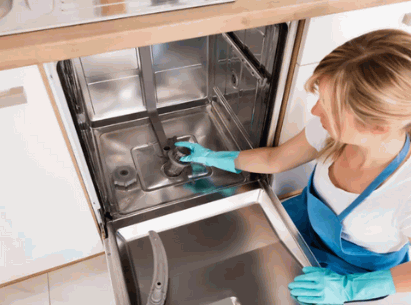
What Are The Signs Of A Clogged Dishwasher Drain? Understanding Clog Prevention
Recognizing the signs of a clogged dishwasher drain is crucial for homeowners to address the issue promptly before it escalates into more significant problems, as suggested by environmental companies. Common indicators include standing water at the bottom, slow drainage, strange noises during operation, and foul odors emanating from the appliance. Being aware of these signs allows for timely maintenance and effective cleaning, helping to extend the lifespan of the dishwasher.
Standing Water In Dishwasher
Standing water in the dishwasher is one of the most apparent signs of a clog that requires immediate attention, as it may indicate the need for water solutions.
When water fails to drain properly, it can lead to unpleasant odors and create an unsanitary environment for your dishes. This situation not only compromises hygiene but can also signify deeper issues within the plumbing system. Homeowners should take this sign seriously and conduct necessary maintenance to resolve the issue swiftly.
Here are some possible causes and steps to address the problem:
- Clogs in the drain filter or hose that need to be cleared.
- Blockages in the sink drain connected to the dishwasher.
- Poor installation or an improperly positioned drain hose.
Immediate actions to take include using Drano if necessary:
- Checking the filter for food particles and debris.
- Inspecting the drain hose for kinks or obstructions.
- Running a cleaning cycle with vinegar to eliminate buildup.
Prompt attention to these maintenance tasks can prevent more serious issues down the line.
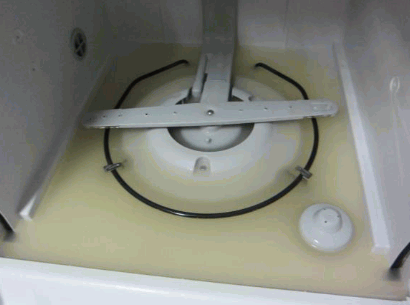
Slow Drainage: Identifying Issues And Solutions
Experiencing slow drainage in the dishwasher is another critical sign that a clog may be forming, which can ultimately lead to unpleasant smells. This issue can lead to inefficient cleaning cycles, leaving behind dirty dishes and food debris. Homeowners should monitor their appliances for changes in drainage speed and take action to investigate potential clogs, including regular checks of the filter.
Ignoring this problem can exacerbate the situation, causing lingering odors and even damaging the dishwasher over time. A common cause of slow drainage is food particles accumulating in the filter or drain hose.
- Clogged strainers can create blockages that prevent proper water flow.
- The presence of grease and soap scum can also contribute to ineffective drainage.
To address these issues, regular maintenance is essential. Homeowners are encouraged to:
- Clean the filter after every use.
- Inspect and clear the drain hose for any obstructions.
By implementing these simple practices, they can enhance the dishwasher’s efficiency and ensure sparkling clean dishes after every cycle.
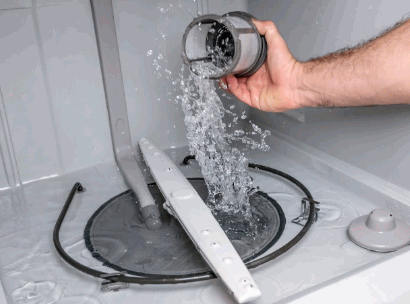
Strange Noises During Operation: Understanding The Signals
Strange noises during the operation of your dishwasher often indicate underlying issues, such as clogs or blockages in the drain. These sounds can signal that food debris or buildup is obstructing normal function, which can lead to more serious problems if not addressed promptly. Homeowners should pay close attention to any unusual noises and consider them a red flag that requires immediate maintenance.
Typically, these strange sounds may manifest in various forms, such as grinding, rattling, or humming. Each noise can suggest different concerns:
- Grinding sounds might imply that leftover food particles are lodged in the impeller, hindering its movement.
- Rattling noises often indicate that dishes may not be secured properly, which can lead to damage.
- Humming noises could suggest that the motor is struggling, potentially due to a blockage.
Addressing these issues promptly is crucial. Regular maintenance, including checks for clogs and cleaning filters, can significantly reduce the risks of these noises occurring. A well-maintained dishwasher not only functions better but also extends its lifespan, preventing costly repairs in the long run.
Foul Odor: Causes And Prevention
A foul odor coming from your dishwasher is a strong indicator that food debris may be stuck in the drain or filter, creating an unsanitary environment for your dishes. This unpleasant smell not only affects your kitchen’s ambiance but also signals the need for immediate cleaning and maintenance. Homeowners should take this warning seriously to restore freshness and hygiene to their appliances.
In many cases, foul odors arise due to a buildup of old food particles, grease, and grime that accumulate in various parts of the dishwasher over time. Regular cleaning is essential to prevent these disturbances. Here are some useful steps for homeowners:
- Start by inspecting the filter located at the bottom of the dishwasher; remove and rinse it thoroughly to clear any trapped debris.
- Check the spray arms for blockages and clean any visible residue.
- Run a hot water cycle with a cup of white vinegar placed in a bowl on the top rack to neutralize odors.
- For a fresh scent, consider adding baking soda on the bottom before running another hot cycle.
Incorporating these cleaning and maintenance practices will ensure your dishwasher remains odor-free and operates efficiently.
